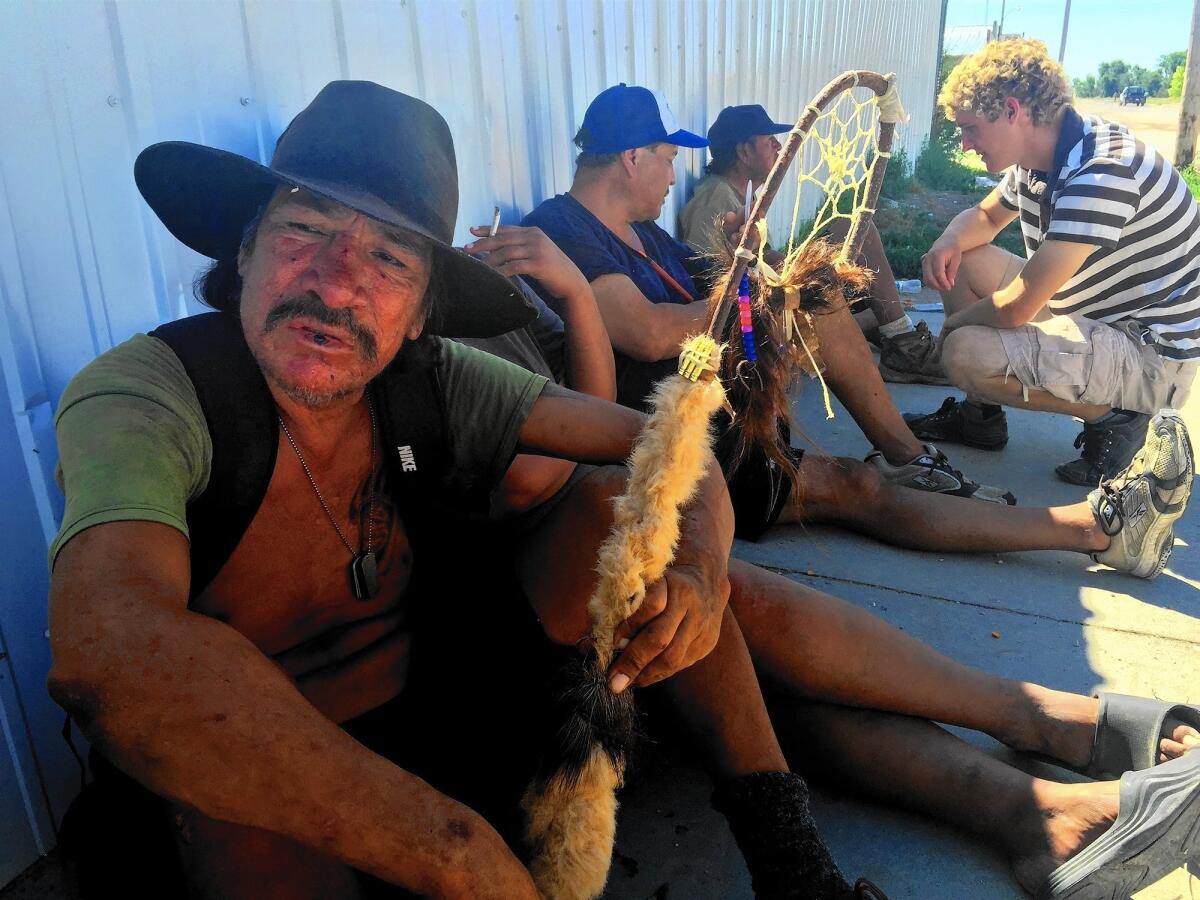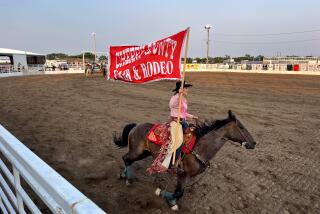In Nebraska, ministry reaches out to Lakota on an alcohol-ravaged skid row

- Share via
Reporting from WHITECLAY, Neb. — Shortly after sunrise, Abram Neumann steps onto Main Street here and walks the daily gantlet of rubbish and ruined lives.
Cries of “Curly!” rise from the curbs and abandoned buildings, a drunken tribute to the young man’s unruly hair.
Bleary-eyed denizens, some of them claiming kinship with Crazy Horse, reach for his hand, yearning for connection, or sometimes a few bucks.
“Come closer,” says one. “I’ll sing you a Johnny Cash song.”
An unsteady woman, her legs covered in sores and bug bites, staggers up.
“I’m not like these people,” she says. “I just need $5 for gas. You don’t want to leave me stranded here, do you?”
The mood swings wildly from merry to menacing as the drinking accelerates.
Neumann kneels in the dirt along this High Plains skid row, listening to the rants, the songs and anguished cries of a battered people here in a place where poverty and addiction collide.
“They really just want someone to hear them,” said the soft-spoken 20-year-old, who does outreach for Lakota Hope, a nondenominational ministry here. “It was shocking at first, but I believe God wants me here.”
With a population of 12, Whiteclay has four liquor stores that sold nearly 4 million cans of beer last year, according to the state’s liquor commission. And almost all of it went to the Oglala Sioux on the Pine Ridge Indian Reservation just over the South Dakota line. Booze has been banned on the reservation for more than a century, yet alcoholism there is rampant. About 60% of the residents are alcoholics, and 1 in 4 babies is born with fetal alcohol syndrome.
And then there are the street people, sometimes 100 or more, who get drunk here on Hurricane High Gravity Lager or Camo Black Ice with alcohol levels of 10.5% or higher. Some are badly bloated with swollen limbs. They sleep in fly-infested trash heaps behind the liquor stores, defecating and urinating wherever they can. Many panhandle, some trade sex for a six-pack.
Bruce BonFleur, 63, runs Lakota Hope and has been working in Whiteclay for 18 years and living there for two. He’s convinced if Jesus still walked the Earth, he’d be walking here among what he calls a “modern-day leper colony.”
The ministry is a 5-acre oasis that provides work space for the artists among the street people, food for the hungry and a base for visiting missionaries.
“God told me, ‘Put my light here,’ and that’s what I have tried to do,” BonFleur said. “We call these people ‘risen warriors’ because I don’t believe God would call them drunks.”
So far every attempt to shutter the liquor stores through protest or civil disobedience has failed. In 2013, Pine Ridge residents, hoping to break the Whiteclay stranglehold, voted to legalize alcohol sales on the reservation only to see implementation blocked by tribal infighting.
In 2012, a $500-million lawsuit was filed against the stores and national breweries saying they knowingly sold beer to people who resold it in Pine Ridge. The suit also alleged store owners traded alcohol for sex and food stamps. A judge dismissed the case, saying he didn’t have jurisdiction to rule on it.
“Do you know how many children were born on that reservation with fetal alcohol syndrome since I filed that lawsuit?” asked attorney Thomas White, who represented the Oglala Sioux in the suit. “It keeps me awake every damn night.”
BonFleur is no outside rabble-rouser. Whiteclay is his home, and he is out to shame Nebraska into dealing with the squalor, public health risks and rampant drug and alcohol addiction infesting his neighborhood. He is also quietly collaborating with Legal Aid of Nebraska to protect the folks on Main Street whom many see as victims of the state’s inaction.
Lakota Hope’s leader is even seeking donations of lifeguard chairs to line the street so volunteers can summon help if a street person is injured.
His efforts recently earned him an invitation to a town hall meeting with Republican Gov. Pete Ricketts in Chadron, 90 minutes south of Whiteclay. After listening to the governor speak, BonFleur rose to his feet and called Whiteclay a “black eye on the state of Nebraska.”
“Nebraska’s motto is ‘equality under the law,’ but there is no equality under the law in Whiteclay,” BonFleur said. “We aren’t against the beer stores, but we want enforcement of the existing laws. There are mentally ill on the streets. There is public urination, defecation and any other ‘cation’ you could think of. The public health situation is untenable, and it wouldn’t be tolerated anywhere else.”
Ricketts said he couldn’t shut people down “because we don’t like their business.”
“But I’m a big believer that the people closest to the problem have the best solutions,” he added.
The governor promised to get law enforcement and the Nebraska Department of Health & Human Services involved and proposed the “broken window” practice of policing — focusing on small crimes to head off larger ones.
Sheridan County Sheriff Terry Robbins, whose jurisdiction includes Whiteclay, did not return calls seeking comment.
Stuart Kozal owns Jumping Eagle liquor store in Whiteclay and said even if he was shut down, people would simply buy beer in Rushville, 20 miles south.
“Honestly, I don’t feel responsible,” he said. “I’ve been here for 35 years and there have always been those who hang around on the streets. It’s their choice, that’s what they want to do.”
Customers streamed through Kozal’s door paying $28.25 for 30-packs of Budweiser. Individual cans were advertised on the “Dollar Menu.” Despite being the smallest of the four local stores, Jumping Eagle sold 24,127 cases of beer, or 579,048 cans, in 2014, state liquor authorities report.
“Look, if I was making the millions of dollars people say I make, I’d be gone by now,” Kozal said. “I’d be in a boat on a lake bass-fishing.”
BonFleur said the store owners are “just as blind and in bondage to what they are doing as the people they sell to.”
He took a short drive from his house and found four drunken men sitting on the steps of a derelict home.
“Bruce, I dreamt I saw Jesus and he was wearing a white robe. He was beautiful but I couldn’t look him in the eyes,” said a morose Justin Charging Crow. “Am I lost, am I going to hell? Please pray for me.”
They held hands and prayed.
BonFleur later reflected on the challenge of staying positive.
“I think God puts us in a spiritual bubble so we don’t feel everything. But then there are times when grief overwhelms me and I just start crying,” he said. “I feel that is God’s mind, that’s what he feels all the time.”
The next morning, he dispatched Neumann back to the streets.
The patient Minnesotan methodically worked his way down the road, listening to every story. And every story was heartbreaking.
“No one holds a gun to your head and makes you drink,” said Wydena White Pine, 35, swigging a beer inside an abandoned garage strewn with squashed beer cans and empty ramen packs. “I’d like to stop for my son. My sister takes care of him now.”
Harley Dreamer, 54, said his dad died of alcoholism.
“I’m sick too because I can’t stop drinking. I have seven sons and two daughters. In our culture it’s disrespectful to drink around kids, so I come here,” he said. “When I wake in the morning I just thank Jesus for another day.”
A van veered over and the driver staggered out. His wife said he was too drunk to drive. She was painfully thin, with big glasses sitting crooked on her face.
“I didn’t used to drink this much until I met him,” she said, gesturing to her husband on the curb. “But I don’t like being alone.”
She began to cry.
“I know I’m a drunk, but Jesus loves me anyway,” she said.
Neumann walked up to a man slumped against a wall in the scorching sun. Floyd “Sonny Boy” Hand, 33, has been in rehab more than a dozen times.
“Pray for me, Curly,” he said.
They held hands.
“Dear God, I pray you watch over my friend and keep him safe,” Neumann said. “I pray he would feel your presence around him, that you would raise him up to be the Lakota man you meant him to be.”
Tears welled in Sonny Boy’s eyes.
“Amen,” he whispered.
More to Read
Sign up for Essential California
The most important California stories and recommendations in your inbox every morning.
You may occasionally receive promotional content from the Los Angeles Times.










